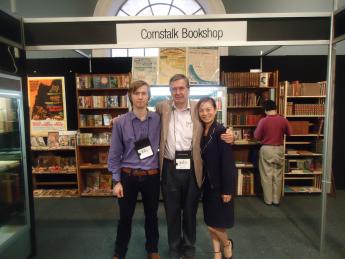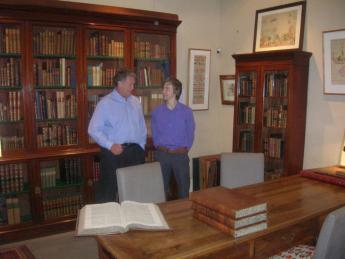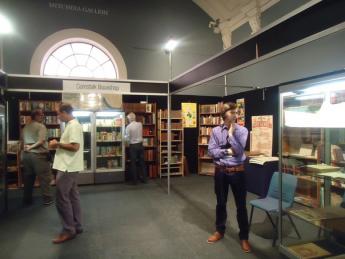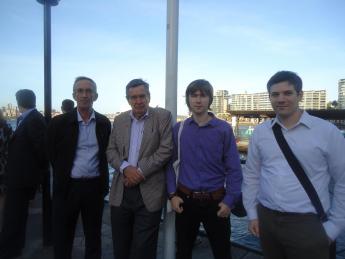Guild of Antiquarian Booksellers
Six Weeks in Australia - The ILAB Internship Program

A report by Pavel Chepyzhov
My internship took place from October to December 2011 when I traveled from Russia to Australia and Hong Kong. I have spent most of my time in Australia with Paul Feain, the owner of Cornstalk Bookshop (Sydney), the organizer of the Hong Kong Antiquarian Book Fair and the co-founder of Sydney Rare Book Auctions.
In two months time I worked for several Australian booksellers, among them Hordern House and Asia Bookroom. I also had the chance of working at the Sydney Antiquarian Book Fair which took place in November. And finally, after spending seven weeks in Australia I traveled to Hong Kong to participate in the Hong Kong Antiquarian Book Fair.
In Australia I was introduced to most of the local dealers and booksellers. In Hong Kong it was immensely interesting to meet book people from all over the world – from Canada to Sweden and from Japan to Taiwan.
In Sydney I explored the local antiquarian book scene. For some time I became Paul Feain’s shadow. He taught me to understand all the aspects of the life of the Sydney bookseller. All colleagues whom I asked about Paul were complimenting him quite zealously. My own feelings were telling me the same. So it’s true: I had the chance to spend much time with one of the best people of the Australian antiquarian book trade who told me everything about his professional life.
I compared my Australian experiences with the only book trade I know well enough – with the Russian antiquarian book trade. As you can imagine I found quite a few differences.
My activities with Paul and the Cornstalk Bookshop included cataloging books, moving books, visiting auctions and bidding at auctions, participating in the house-calls, preparing for the Book Fair and so on and on. One of the big challenges for me was to learn how to make descriptions of the books in English – how to translate in my mind all the possible ‘tears’ and ‘sights of wear’ into the right phrases. By the end of my internship I was quite familiar with the terms and I think now I can do bilingual descriptions if needed. I was introduced to the bibliographies which are required to describe books on Australia, Asia, voyages, medicine and natural history. Paul owns a decent collection of bibliographical works.
For two weeks I worked at Hordern House. Hordern House is one of the top dealers worldwide who are specialized in books on voyages and exploration. As one of the American dealers told me later at the Hong Kong Fair at Hordern House it is ‘how the book shop should look like’. Everything at Hordern House is very professional and high-leveled - from the organization of the everyday business to the quality of the books. I had the great pleasure to join the friendly team of dealers, bibliographers and other book people there.
Hordern House is the place where travel books feel at home. The people who work here know everything about taking care of them. The subjects of Hordern House's books are very wide and very specific at the same time. Here you find books on voyages in all imaginable languages including Swedish, Russian, and Chinese. A special delight for me was to discover a Russian book on the shelves. It is a very important account on the Russian exploration of East Siberia.
The Sydney Antiquarian Book Fair deepened my views on the Australian antiquarian book trade. I liked that the fair was well-organized and well-represented – there were booksellers from all over Australia, from Sydney, Melbourne, Canberra, Perth, Adelaide, Brisbane, Tasmania, as well as from overseas.
I was involved in the fair from the beginning to its end, and even some time afterwards. Actually most of the time my hands were occupied by lifting boxes with books, arranging books on the shelves and shaking the hands of colleagues. I enjoyed the latest with great pleasure because the fair was a big chance for me to get to know the booksellers from all over Australia.
At the fair I got a general impression of the typical Australian bookseller and I draw some conclusions about the trade in this country.
1. The antiquarian book trade in Australia is a strong field. Despite being a relatively young country Australia has a great book tradition. The dealers are organized in The Australian and New Zealand Association of Antiquarian Booksellers (ANZAAB). The Australian book community is not that large which has a big advantage: It allows every member to be speak and to listen to everyone.
2. There is a well-known believe that the Australian dealers are concentrated on Australiana maybe even more than the Americans are concentrated on Americana. This is true, but only partially. Australia has all kind of bookshops – the presence of the shops like Asia Bookroom which deals mostly in books on Asia is a good proof for that.
3. There is also a general opinion that Australian collectors share the same Australia-mindedness. For this reason many international dealers do not participate in the Sydney or Melbourne Fairs. However, this belief has also proven to be false – I witnessed that Ursus Books from New York did very well at the Sydney Fair.
The Sydney Antiquarian Book Fair itself was quite lovely. The fact that it was held at the State Library of New South Wales said a lot to me. In Russia this would never happen, because Russian dealers and librarians have some sort of the rivalry. For me, it was really unique that the libraries and book dealers in Australia have an agreement about everything and that they act side by side in harmony. This is quite a remarkable and important factor, because it shows how both sides understand that they care about the same cultural treasure – the book.
After the fair in Sydney I spend some time in Canberra with Sally Burdon – the current ANZAAB President and owner of the Asia Bookroom. In my view this is the most specific bookshop I have seen during my internship in Australia.
Apart from bookselling Sally is doing a lot of book-related things that I quite enjoyed – running a book-discussion club, doing charity etc. It is hard to imagine that an antiquarian bookshop in Moscow would do anything like this. I also liked the fact that Sally is ‘a condition maniac’. At her shop I have seen the most accurate book descriptions ever and, indeed, it is very important for a bookseller to describe the item he or she sells with all its possible defects, hiding nothing.
Six weeks later, I traveled back North – not as far as Moscow for now, but to Hong Kong, the most Western of all Eastern cities, the business capital and home of the annual Hong Kong International Antiquarian Book Fair. In 2011 the Hong Kong Fair took place for the fifth time, organized - as always - by Paul Feain and Mitsuo Nitta, the famous Japanese bookseller who was President of the Japanese Association (ABAJ) for several decades.
I was still in the position of Paul’s shadow. This allowed me to see how the fair is organized. Hong Kong is quite a young field for the antiquarian book trade – it is a field of many possibilities. No wonder that there were lots of international exhibitors offering a vast variety of books from incunabula to modern first editions, including a considerable number of books and prints on Asia. I was lucky to meet many booksellers from all over the world and managed to talk about things I had always been interested in but never had the right people to ask.
One of the highlights was meeting Mitsuo Nitta and other Japanese booksellers. Japan has a great tradition of bookselling but in many ways the Japanese trade a closed market. David Lilburne was another interesting person whom I met at the fair. He is a former president of the Antiquarian Booksellers’ Association of America (ABAA) and a native Australian. So I had a lot of things to discuss with him.
All in all I would like to say that this ILAB internship gave me the incredible chance to see the world of the antiquarian book trade – especially its Eastern branch which, in a way, is the branch Russia belongs to. I have seen how things should be in the different areas of the trade and I believe I will be able to use this knowledge back home. Working in an auction house in Russia I vmanaged to meet some people during my internship who occupy similar positions in their countries – in Australia, USA, China and Germany. It is very important for me to have this experience. I believe it will allow me to make fewer mistakes on my way into the trade.
I want to add how grateful I am to ILAB and to the Moscow State University of the Printing Arts who gave me this opportunity, and I want to thank especially Paul Feain, Eric and Alisa Waschke, Olga Tarakanova, Sally Burdon and Alena Lavrenova who helped me to get there so that I could have the greatest time of my life.



